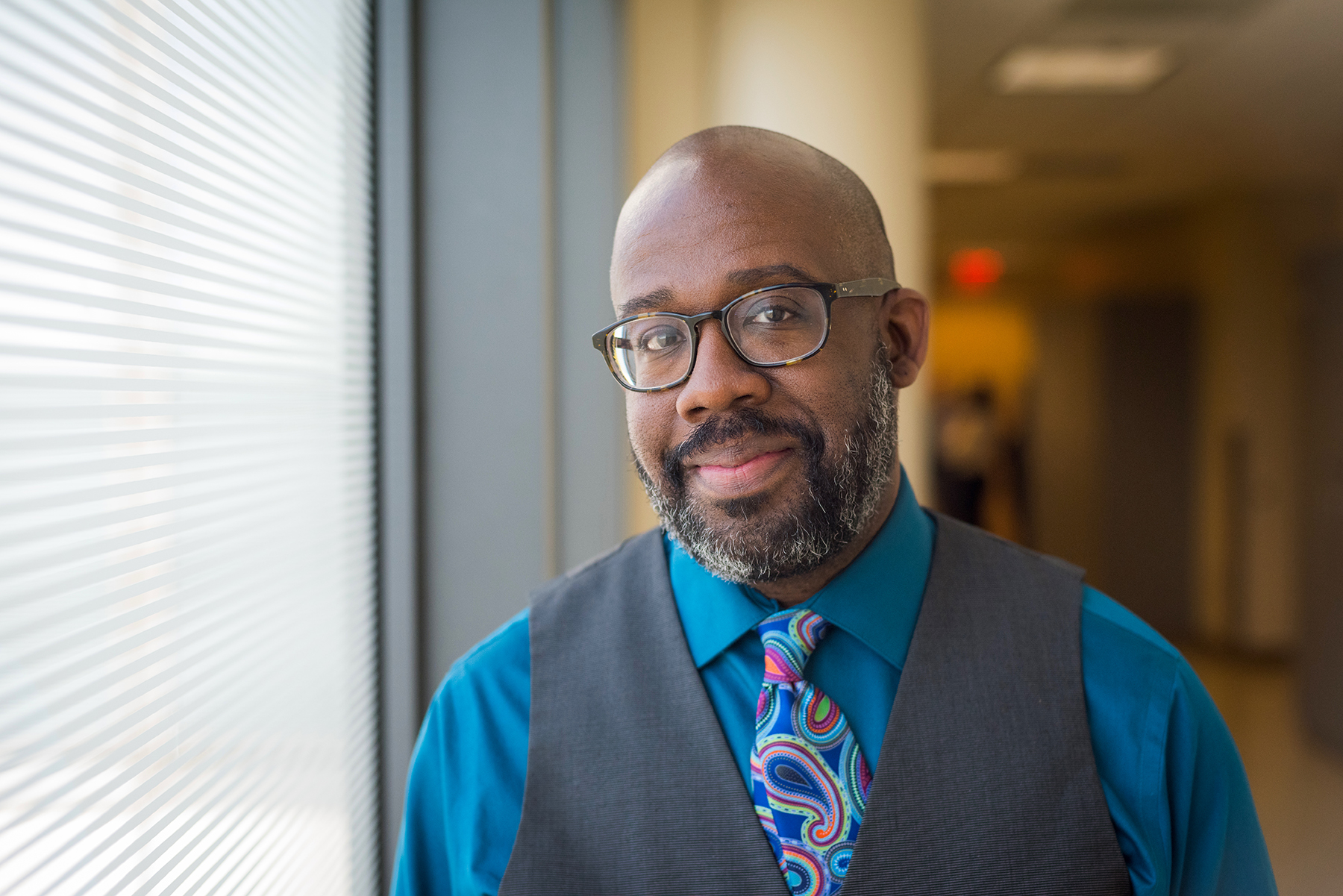Alabama Parkinson’s Patient Helps Raise Awareness, Especially in Black Community
Written by |

Michael S. Fitts (Photo by Sam Ogden)
The early signs can be subtle, and Parkinson’s disease is not a top-of-mind diagnosis for people younger than 50. So, Michael S. Fitts endured a battery of diagnostic tests with his primary care physician in Birmingham, Alabama, before seeking referral to a neurologist.
“I was in denial,” said Fitts, a black man who was 37 at the time. “I felt like whatever I was dealing with was a neurological disorder, but I didn’t think it was specifically Parkinson’s because I didn’t think people of color had this.”
For Fitts, the first recognizable sign was a slight, periodic hand tremor. Fitts was riding in a car in the summer of 2010, when his friend asked if he was cold. Fitts said he wasn’t. His friend commented on the tremor, which Fitts brushed off as something that happened every now and then. But the exchange prompted a year-long diagnostic journey before a neurologist eventually told him he had Parkinson’s.
Shaken and concerned about his future, Fitts sought a second opinion, which confirmed the diagnosis. At age 38, Fitts plunged into a state of depression and anxiety and getting out of bed became a daily challenge. As he struggled to come to grips with the disease, he told no one.
A specialist in movement disorders suggested a local support group for those with early-onset Parkinson’s. After overcoming his reluctance, Fitts realized it was the best thing he could have done. The group provided encouragement and shared tips on living with the disease as well as information on new research.
“Don’t isolate yourself because it will make your situation worse. Get someone to talk to,” he advised.
Creating a circle of support
Two years after his diagnosis, the tremors were becoming more obvious, and Fitts had difficulty holding a glass steady at workplace receptions. Fitts chose to share his diagnosis with his supervisor and colleagues at the University of Alabama at Birmingham (UAB) where he’s a medical librarian.
He said the decision to disclose Parkinson’s at the workplace is personal and individual. Patients should carefully consider how and what to tell colleagues.
An assessment at the Lakeshore Foundation, which partners with UAB on research, identified potential workplace accommodations, such as speech-to-text software. While Fitts doesn’t need such software now, he might later.
Fitts began to move from diagnosis to advocacy as he identified available resources and worked to expand support networks for others. He also convinced UAB’s Employee Assistance and Counseling Center to launch Hopeful Healing, a monthly support group for employees coping with any type of chronic illness.
In 2016, Fitts presented the opening session of a local Partners in Parkinson’s program. Hosted in 25 major U.S. cities, the events were an initiative of the Michael J. Fox Foundation (MJFF) and biopharmaceutical company AbbVie with the goal of providing educational resources to Parkinson’s patients and improving care at every stage of the disease.
“I don’t consider myself to be a public speaker, but I got a lot of positive feedback from the event,” Fitts recalled in a telephone interview with Parkinson’s News Today. “There are lots of ways to advocate, and whenever I can make an impact, I’ll do it, even if it means moving outside of my comfort zone.”
The event marked the beginning of Fitts’ work with MJFF, which led to him serving on the foundation’s Patient Council and filming the video series Parkinson’s 360º, “Getting to Know Parkinson’s Disease.”
“I personally love this series because of the diversity of participants,” Fitts said. “People need to see somebody they can identify with.”
As an African American, Fitts recognizes he is uniquely suited to serve as an advocate for both people with early-onset PD, as well as black Parkinson’s patients.
“We need to change the perception of Parkinson’s and demystify the whole perception of the disease as being associated with older white men,” said Fitts, now 46. “Part of it is giving people accurate information about the disease.”
The motor symptoms of Parkinson’s often immediately come to mind, but non-motor symptoms — loss of sense of smell, smaller handwriting, trouble sleeping, moving or walking — also can be important indicators.
“I want to bring awareness to Parkinson’s and what the symptoms are and how it affects people in different ways,” Fitts said. “If I would have known about some of the non-motor symptoms, such as a keen sense of smell, I probably would have sought medical attention earlier.”






